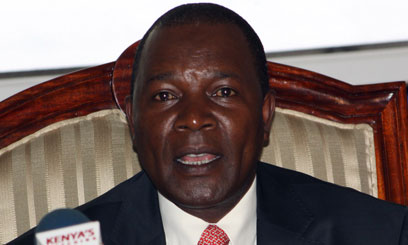Banks
Treasury Nominee Prof Ndung’u Hints Poor Governance At CBK Under Current Leadership

The nominated cabinet secretary for Treasury Njuguna Ndung’u Thursday stated his concern about recent bank collapses, in comments seen as a veiled rebuke of Central Bank of Kenya (CBK) Governor Patrick Njoroge’s leadership.
Prof Ndung’u, who was replaced at central bank by Dr Njoroge in 2016, condemned his successor for letting three banks collapse in quick succession six years ago and using scare tactics to control the banking sector.
He did not mention Dr Njoroge by name but made comparisons of their tenures, arguing that no bank collapsed during his time despite having similar challenges within the sector.
Bank CEOs say Dr Njoroge, a US-educated economist and a former adviser at the International Monetary Fund (IMF), oversees the sector with a heavy hand, and many of the executives tend to avoid commenting on industry issues like the exchange rate for fear of reprisals.
Depositors and investors in Kenya were rattled during his first term when the CBK took control of three mid-sized banks — Dubai Bank, Chase Bank and Imperial Bank— after they failed to meet their statutory obligations.
Dubai Bank is facing liquidation while Chase Bank and Imperial Bank had their good loans and deposits transferred to State Bank of Mauritius (SBM) and KCB respectively.
Prof Ndung’u reckons that the role of a CBK governor is not to bully the market with an ‘axe’ but to protect the industry.
“No bank collapsed during my time, but that does not mean there were no problems. There were problems but we had to develop interventions to save the market. There were several mergers but those mergers were actually geared towards preventing any collapse,” Prof Ndung’u told Parliament during his confirmation hearings.
“Market situations change, and the regulator must know what to do. A regulator is not someone who is waving an axe in the market, he is a person who is trying to understand, help develop, regulate and protect the market.”
Dr Njoroge has faced criticism for his decision to shut Dubai Bank, Imperial Bank and Chase Bank within nine months of each other, forcing the central banker to change his policy to arranged mergers in a bid to prevent further collapses.
Dubai Bank was placed under receivership in August 2015, followed by Imperial Bank in October the same year and Chase Bank in April 2016. Prof Ndung’u served as the CBK governor from March 2007 to March 2015.
In announcing the collapse of Dubai Bank, the CBK cited the same malpractices that had long been pointed out by the whistleblowers, revealing the divergent regulatory approach between the current and former regulators.
The shock collapses locked billions of shillings in depositors’ cash in the failed lenders and triggered panic withdrawals from smaller banks and a shift of cash to the larger lenders that were considered stable in what was dubbed “flight to quality”.
After the collapse of Chase Bank, the CBK was forced to introduce liquidity support for ailing banks while midwifing deals between weak lenders and stronger peers to avoid a repeat of the crash.











